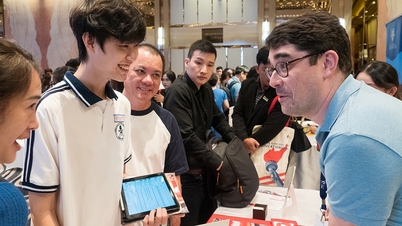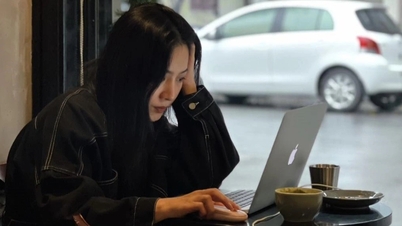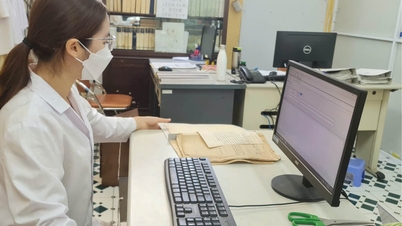"Buy because you like it, spend because of habit"
Nguyen Anh Khoi, a second-year student at the Trade Union University, shared: "I also know that I should prioritize necessary expenses such as food and study, and not spend too much money on things like buying random things or going out too much.
But when I hold money in my hand and see friends inviting me to go out for coffee, go to the movies or hunt for discounted items, I'm tempted.
I thought these expenses were not much, but when added together, they took up a whole month's salary from overtime. At the end of the month, I looked back and saw that there was nothing left. Once, I had a minor car accident and needed money for car repairs and medical treatment, but I couldn't find enough money.
At that time, I felt really helpless, worried and blamed myself. For several days, I had no spirit to do anything, and I also neglected my studies. From then on, I understood that if I didn't save from the beginning, the consequence would not only be running out of money in an emergency, but also affect my spirit and studies."
For many students, such situations have happened before. The habit of spending without thinking carefully "spending first, thinking later" has become familiar in life.
This not only affects personal finances, but over time can easily create unreasonable spending habits.

Students get lost in the spending maze and can completely "financially empty" by the end of the month (Illustration: AI).
Bui Thi Kim, a first-year student at Hong Duc University, also shared: "I used to think that investing in my social media image through clothes and accessories was a way to express myself and create my own style.
I spend a lot of money on fashion items, but some of them I only wear once or twice for photos and then put away. In addition, I also spend a lot of money on restaurants, coffee shops, or places with beautiful scenery to take photos.
It's not really necessary, I just want my photos to look impressive and get a lot of likes and comments online. Even though I know this is just virtual recognition, I'm still passionate about it."
Investing in personal image through clothing and beautiful photo locations is not only a popular trend, but also a way for many young people to seek recognition and self-affirmation.
However, when this becomes a financial and psychological pressure, the line between necessity and extravagance in spending can blur.
The desire to express themselves causes many young people to buy things just to satisfy their temporary needs. In the long run, they don't really use them."

Recording income, expenses and dividing finances by category will help you better control your accounts (Illustration: AI).
How to keep students from overspending
As a financial expert and personal finance consultant with many years of experience, Mr. Nguyen Minh Tuan shared: "Not being able to control personal finances well can easily cause students to overspend. Before shopping, ask yourself: "Is this item really necessary?" or "Does it have long-term value?" Consider skipping it or finding a more suitable option.
Try creating a monthly budget or using one of the popular budgeting apps available today. It may sound boring, but recording your income, expenses, and dividing your finances by category will give you a clearer picture of your financial situation."
Experts share that dividing expenses into two groups such as necessary expenses such as tuition, rent, food and unnecessary expenses such as eating out or shopping will help students realize where they are spending and can adjust more reasonably.
"At the end of the month, look back to see how you spent your money, whether any of it exceeded your budget, and adjust for next month. This will help you gradually improve your financial management skills," Minh Tuan added.
Mr. Le Van Tuong, a finance lecturer at the Faculty of Economics at a university in Hanoi, also gave some tips to help students save effectively.
He always encourages students to participate in counseling sessions and seminars for students. From there, they can master the principles of smart spending, personal financial planning and develop savings habits.
Additionally, students can save by looking for discounts or choosing used products.
"Currently, there are many stores and services that have special offers for students. You can search online or ask your seniors. You can ask for books and documents from your seniors, and you can buy necessary items at reputable second-hand markets. This is also a way to help you save some money," Mr. Tuong shared.
Besides, the teacher also suggested: "If you feel bored or stressed, instead of rushing into shopping, try finding other activities such as exercising, reading books or meeting friends to help you change your habits."
Having a clear understanding of the value of each expense is important to avoid waste and build healthy financial habits. "Every spending decision can affect your future and financial habits. Therefore, consider carefully before making a choice," said Mr. Tuong.
Mai Tham
Source: https://dantri.com.vn/giao-duc/mai-ca-phe-san-hang-ha-gia-sinh-vien-giat-minh-khi-cuoi-thang-trang-vi-20250520122641990.htm



![[Photo] 12th grade students say goodbye at the closing ceremony, preparing to embark on a new journey](https://vphoto.vietnam.vn/thumb/1200x675/vietnam/resource/IMAGE/2025/5/28/42ac3d300d214e7b8db4a03feeed3f6a)
![[Photo] Vietnamese and Hungarian leaders attend the opening of the exhibition by photographer Bozoky Dezso](https://vphoto.vietnam.vn/thumb/1200x675/vietnam/resource/IMAGE/2025/5/28/b478be84f13042aebc74e077c4756e4b)

![[Photo] Prime Minister Pham Minh Chinh receives a bipartisan delegation of US House of Representatives](https://vphoto.vietnam.vn/thumb/1200x675/vietnam/resource/IMAGE/2025/5/28/468e61546b664d3f98dc75f6a3c2c880)




















![[Photo] General Secretary To Lam works with the Central Policy and Strategy Committee](https://vphoto.vietnam.vn/thumb/1200x675/vietnam/resource/IMAGE/2025/5/28/7b31a656d8a148d4b7e7ca66463a6894)


































































Comment (0)